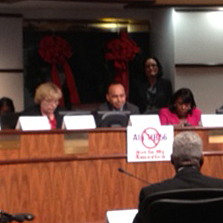Help From Washington: Members of Congress See Firsthand the Damage of Alabama’s H.B. 56 And Speak Out


For the past couple of months, news has been trickling into Washington about the effects of Alabama’s racial profiling law, H.B. 56.
News stories have covered the plight of Alabama farmers, who now have crops rotting in the fields since their Latino workers fled the state for fear of harassment. Many Americans have also heard about the effect the measure has had on children, who not only feel unwelcome in their schools, but also in their communities. Reporters have also shared stories of families who are prisoners in their own homes, afraid of arrest and deportation.
But as the media continued to paint a grim picture of Alabama post-H.B. 56 — Washington remained relatively silent.
Today, 11 members of the U.S. House of Representatives changed that. They traveled to Birmingham to meet with Alabamians directly.
The members held a field hearing this afternoon, where they heard from the city’s mayor, the county sheriff, the superintendent of Birmingham City Schools, a civil rights advocate, a teacher from a local high school, a concerned parent, an undocumented immigrant from Tuscaloosa, a 17-year-old undocumented student with undocumented parents, and a local business owner. They all testified about the impact of the law on their lives.
Rep. Luis Gutierrez (D-Ill.) chair of the Congressional Hispanic Caucus’s Immigration Task Force, led the hearing and said he hoped revelations from the trip would open up discussion on the Hill.
Please note that by playing this clip You Tube and Google will place a long-term cookie on your computer. Please see You Tube's privacy statement on their website and Google's privacy statement on theirs to learn more. To view the ACLU's privacy statement, click here.
“I was in Alabama in October and I came back to Washington and said to my colleagues, ‘you have got to go and see for yourself,’” Gutierrez said. “In other states we have seen anti-immigration bills pass, but in Alabama it has triggered something unique. The fear and chaos in a small, not very well-established Latino and immigrant community has run deeper. The feeling of danger and despair is palpable, perhaps owing to Alabama's history of dogs and water cannons and bombings and worse.”
In October, ACLU Legislative Counsel Joanne Lin, along with several allied civil rights groups, called on Congress to denounce H.B. 56 and to recognize the trend of “show me your papers” laws as a national crisis. Alabama’s H.B. 56 joins other racial profiling laws enacted in Arizona, Utah, Indiana, Georgia and, most recently, South Carolina.
“These states are bent on forcing Latinos and immigrants out of their states by creating an unbearably hostile environment,” Lin said. “These unconstitutional laws discriminate on the basis of race and national origin, and sweep in U.S. citizens, lawful permanent residents and other people lawfully in the U.S. These state laws are not only creating chaos in our country’s immigration system; they are creating a civil rights crisis of national proportion.”
After the hearing, the members will meet privately with leaders of the immigrant advocacy and civil rights community in Birmingham and across the state at the Civil Rights Institute. Tonight, the representatives will attend a rally in Birmingham as part of the “One Family, One Alabama” campaign launch — an effort to repeal H.B. 56.
The Washington Legislative Office will be live tweeting from a solidarity vigil to repeal H.B. 56 outside the White House tonight. Follow @ACLULive.
To learn more about the crisis in Alabama, click here.
Members who have traveled to Alabama include: Rep Luis V. Gutierrez (D-Ill.), Rep. Terri A. Sewell (D-Ala.), Rep. Joe Baca (D-Calif.), Rep. Yvette D. Clarke (D-N.Y.), Rep. Charlie Gonzalez (D-Texas), Rep. Al Green (D-Texas), Rep. Raul Grijalva (D-Ariz.), Rep. Sheila Jackson Lee (D-Texas), Rep. Zoe Lofgren (D-Calif.), Rep. Grace Napolitano (D-Calif.) and Rep. Silvestre Reyes (D-Texas).
Learn more about immigrants' rights: Sign up for breaking news alerts, follow us on Twitter, and like us on Facebook.

